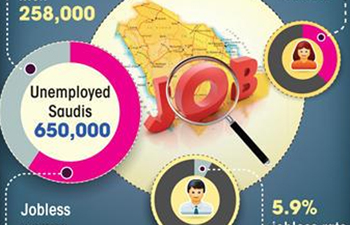Jeddah, Feb 16: The Nitaqat nationalization program was successful in bringing down the Kingdom’s unemployment rate to 11.7 percent — 5.9 percent among men and 32.5 percent among women, said the Central Department of Statistics and Information (CDSI).
 In a statement issued on Sunday, the department put the total number of unemployed Saudis at 650,000, including 258,000 men and 392,000 women.
In a statement issued on Sunday, the department put the total number of unemployed Saudis at 650,000, including 258,000 men and 392,000 women.
The department, which comes under the Ministry of Economy and Planning, said reports on unemployment rate in the Kingdom published by some newspapers and other media organizations were not correct.
It emphasized that the Labor Ministry has been supporting the statistics issued by the department in the previous years.
Referring to the statistics issued by the Human Resource Development Fund (HRDF), the CDSI said those figures are related to people who have registered with its Hafiz program to get unemployment benefits.
“Those figures do not represent the number of unemployed Saudis in any way,” the department insisted. “Neither the Labor Ministry nor HRDF and CDSI have published these figures as unemployment indicators,” it added.
A previous report said the unemployment rate among Saudi women in 2013 was 34 percent and among men 6.2 percent. A manpower expert attributed the increase in unemployment rate among women to high percentage of fresh graduates and lack of new job opportunities suitable for them.
The Labor Ministry intends to launch the third phase of Nitaqat on April 20 to create more jobs for Saudis in the private sector.
The Nitaqat helped employ 750,000 Saudis in the private sector until the end of the Hijrah year 1435, showing 15.6 percent rise in Saudization during the year.
Saudi bloggers did not agree with the department’s figures and said the unemployment rates among men and women are much higher. “The total number of unemployed Saudis will be more than a million,” said one blogger while another said the figure would cross six million.
Another blogger pointed out that 1.5 million Saudi men and women have been registered with Hafiz program to receive unemployment allowance, questioning the CDSI statistics. “I think the unemployed in remote villages may not have been counted by CDSI,” said another blogger.





Comments
Add new comment